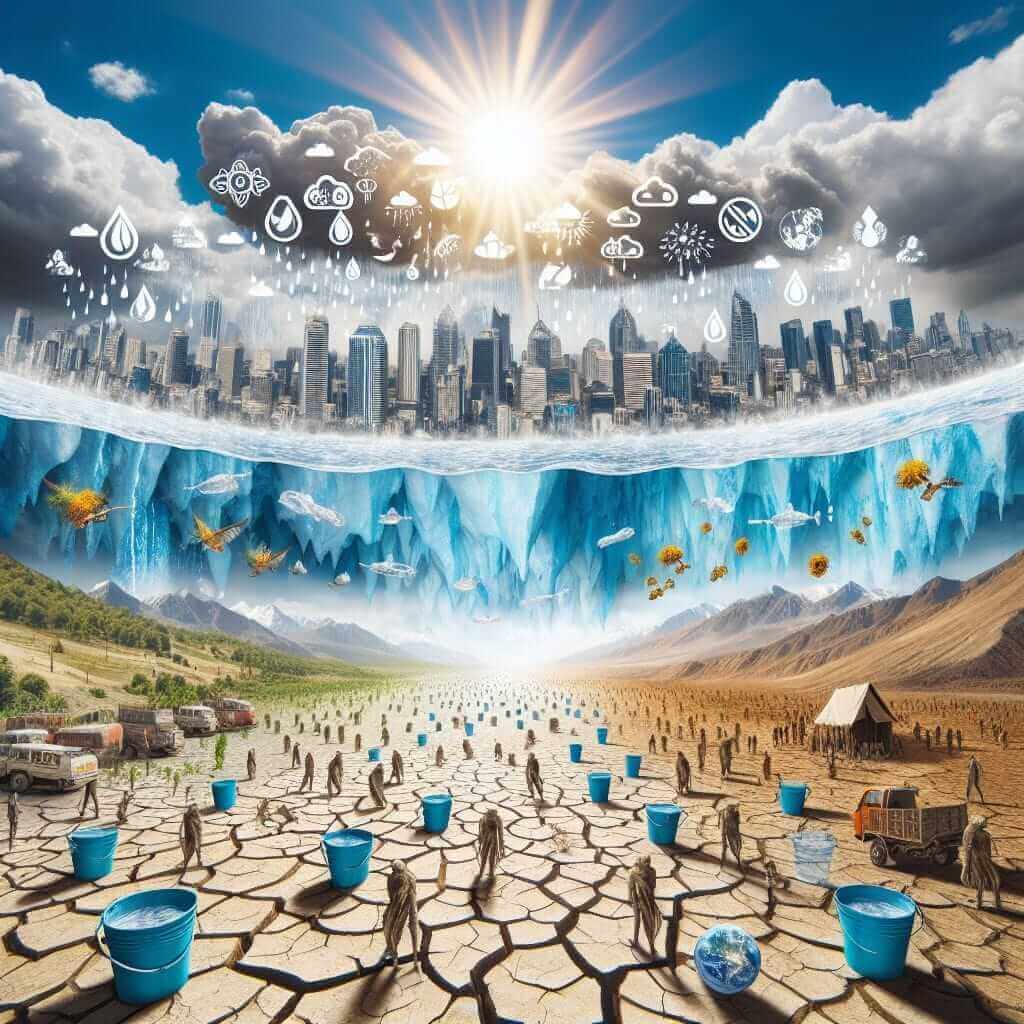The IELTS Reading test can be demanding, requiring candidates to read quickly, identify key information, and comprehend complex texts. One prevalent theme in recent IELTS exams is climate change and its various impacts. Specifically, understanding “What are the effects of climate change on water availability?” is crucial as it ties into current global discussions on environmental sustainability. Given its relevance, this topic is likely to appear again in future exams, making it essential for IELTS candidates to prepare thoroughly.
IELTS Reading Practice Test: Climate Change and Water Availability
Reading Passage (Medium Text)
Water scarcity is an emerging problem impacting millions of people around the globe, and climate change plays a significant role in exacerbating this issue. The Intergovernmental Panel on Climate Change (IPCC) has warned that rising global temperatures are leading to more intense and unpredictable weather events, such as prolonged droughts, torrential rains, and melting glaciers. These changes have direct repercussions on water availability, which is essential for human survival, agriculture, and ecosystem health.
-
Impact on Freshwater Resources:
Climate change affects the hydrological cycle, leading to changes in precipitation patterns. Some regions experience extended dry spells, reducing the levels of rivers, lakes, and aquifers that supply freshwater. In contrast, other areas may face heavy rainfall, causing floods and contamination of water sources. The variability in water availability poses significant challenges for water management systems worldwide. -
Agriculture and Food Security:
Water is a critical resource for agriculture, the sector most susceptible to climate variability. Reduced water availability can lead to crop failures and decreased agricultural productivity, thereby threatening food security. Farmers dependent on rain-fed agriculture are particularly vulnerable, as their livelihoods are closely tied to predictable rainfall patterns, which climate change disrupts. -
Effects on Ecosystems:
Ecosystems also rely heavily on balanced water availability. For instance, wetland ecosystems, which provide essential services such as water purification and habitat for biodiversity, are at risk due to altered precipitation and evaporation rates. Similarly, freshwater species are jeopardized by fluctuating water temperatures and levels, leading to potential declines in biodiversity. -
Human Health and Livelihoods:
The intersection of water scarcity and human well-being cannot be overstated. Limited access to clean water heightens the risk of waterborne diseases and can lead to conflicts over water resources. Additionally, communities that depend on glacial meltwater for their primary water supply are finding their sources shrinking as glaciers recede.

Questions
Multiple Choice
-
What significant impact of climate change on water resources is highlighted in the passage?
a. Salinity levels in oceans
b. Changes in precipitation patterns
c. Expansion of desert areas
d. Increased number of hot springs -
Which sector is considered most vulnerable to changes in water availability due to climate change?
a. Manufacturing
b. Agriculture
c. Technology
d. Tourism
Identifying Information (True/False/Not Given)
- Climate change has no effect on the hydrological cycle.
- Farmers who rely on rain-fed agriculture are particularly affected by changes in rainfall patterns.
- Ecosystems will eventually adapt to any changes in water availability.
Summary Completion
Complete the summary using the list of words below:
Words: health, forests, farmers, ecosystems, food security, glaciers
Climate change impacts water availability, which is critical for agriculture and __. Reduced water availability threatens __ due to crop failures, and the retreat of __ affects communities relying on them for water supply.
Answers
Multiple Choice
- (b) Changes in precipitation patterns
- (b) Agriculture
Identifying Information
- False
- True
- Not Given
Summary Completion
- agriculture
- food security
- glaciers
Common Mistakes
- Skimming Issues: Many students fail to skim the passage properly, missing key points about water scarcity and climate variabilities.
- Misinterpreting Questions: Ensure to read the questions carefully. Some students mistake details about water availability effects, leading to incorrect answers.
- Time Management: Students may spend too much time on difficult words or passages. Focus on answering what you can quickly, then return to challenging segments if time permits.
Vocabulary
- Hydrological cycle (noun) /ˌhaɪdrəˈlɑːdʒɪkəl ˈsaɪkəl/: the continuous movement of water on, above, and below the surface of the Earth.
- Precipitation (noun) /prɪˌsɪpɪˈteɪʃən/: any form of water that falls from the sky, such as rain, snow, sleet, or hail.
- Ecosystem (noun) /ˈiːkoʊˌsɪstəm/: a community of interacting organisms and their physical environment.
Grammar Focus
- Relative Clauses:
- *That’ clauses: Ex: “Farmers that depend on rain-fed agriculture are…”
Formula: Noun + that + verb
- *That’ clauses: Ex: “Farmers that depend on rain-fed agriculture are…”
- Conditionals:
- First Conditional: Ex: “If water availability decreases, food security will be threatened.”
Formula: If + present simple, will + base verb
- First Conditional: Ex: “If water availability decreases, food security will be threatened.”
Tips for High IELTS Reading Scores
- Practice Regularly: Familiarize yourself with various topics and question types.
- Expand Vocabulary: Particularly focus on academic and topic-specific words.
- Develop Skimming and Scanning Techniques: Improve your ability to locate information quickly.
- Time Management: Allocate your time wisely; practice under timed conditions.
With diligent practice and strategic preparation, achieving a high score on the IELTS Reading section is very attainable. Start by using this guide to hone your skills on pertinent topics like climate change and water availability. Happy studying!